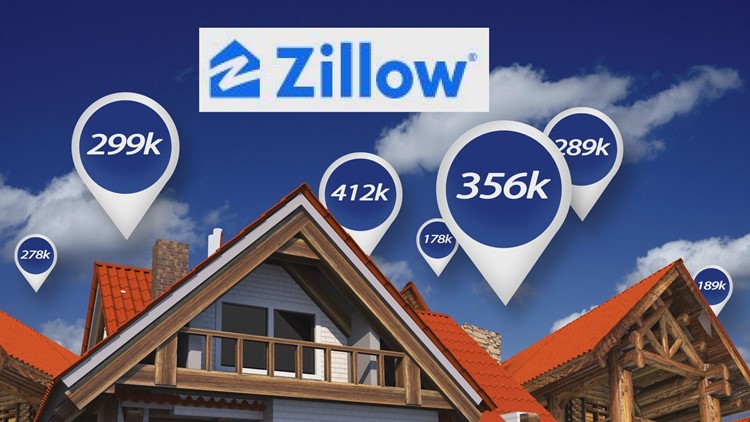KANSAS CITY, Mo. — Kansas City homes are among the fastest-selling in the country, with many going for more than their asking price. Imagine, then, the surprise of one area couple to find their $1 million-plus house listed for sale on Zillow for a meager $10,200.
Jamey and Lauren Bertram had no plans of moving from their five-bedroom ranch home when they were alerted by friends of the "for sale by owner" listing on the real estate website showing photographs of their house, the Kansas City Star reported on Friday.
"Our house has been hacked on Zillow," Jamey Bertram told the newspaper, saying he had spent "the last three days trying to unwind this person that has taken over my house online. I've had zero help from Zillow," added Bertram, calling the scenario "a hot mess."
Bertram's home was first listed for market value, or about $1.2 million — a tactic that likely helped get it past the website's fraud detectors. Once online, the listing was edited to have the price drop to $10,200, with the phony seller chalking it up to a charitable tax break.
"My family and I own many houses across the U.S.," the listing read. "Once a year we sell one or a few of our homes to first time buyers for under $25,000. This is done to bless a family or individual that needs it, but also as a tax write off for us."
The listing directed those interested to call "Mandi" at a number with a Las Vegas area code. Upon calling the number, the newspaper's reporters were told to send $200 through an online banking app, which would be followed with a home walk-through.
"We have people showing up at our house, knocking. They want to come in and see our house," Bertram said.
Zillow at first requested that Bertram provide proof of homeownership, then left him waiting. "I've heard nothing since," he said. "It's just a complete scam."
The listing was taken down by Zillow on Friday.
Criminals have long preyed on people looking to buy a home, so it's of little surprise to find such scams popping up on real-estate sites like Zillow. Phony real estate listings are often created with photos and descriptions taken from real posts, and frequently tout homes being sold at outlandishly low prices. Once would-be bargain hunters contact the scammers, they are asked by the scammers to send their personal information or payment, often in the form of a wire transfer.
Scams like the one outlined by the Missouri newspaper involving the Bertrams' home have played out in multiple states, frequently in areas with seven-figure properties. One Seattle resident in November alerted her local TV station after spotting a listing on Zillow offering a million-dollar home for $10,245, as reported by KIRO 7. As with the Missouri listing, it included instructions to call a Mandi in Las Vegas and wiring cash — in this case $245 — to the fake seller's "mom."
Oklahoma County Assessor Larry Stein in January warned that scammers were listing costly homes online at a fraction of their value, several local news outlets reported. Stein also noted instructions to contact a Mandi and that the phony offers referenced a desire to help first-time home buyers, calling it "a blessing for us."
The relentless efforts at tricking people into parting with their cash prompted Michigan's Attorney General Dana Nessel to issue a consumer alert in March, citing an online posting on Zillow that listed a Florida house priced at less than 3% of its actual worth, and requiring a $4,500 deposit to view the home.
"Zillow strives to provide a safe online platform with accurate information, which is why we go to great lengths to prevent inappropriate content from being posted and to fully inform users of how to protect themselves online and offline. Our teams monitor activity in several different ways, actively screening out fraudulent listings, and if an existing listing is found to be spurious, it is removed from our sites as quickly as possible," a Zillow spokesperson told CBS Moneywatch in an email.
The company also directs people to got to its website for advice on "how to spot and avoid bad actors in the housing market, including red flags such as requests for wire transfers or prices that seem too good to be true."
According to the Federal Bureau of Investigation, more than 9,500 people were victims of real estate fraud in 2023 alone. The agency, which says that people desperate for a good deal are especially vulnerable, offers the following tips on avoiding being victimized by real estate and rental scams:
- Do not wire funds to people you do not know.
- Do not put money toward a house you have not seen.
- Confirm the identity of the landlord by researching public records to find out who owns the property you are seeking to rent or purchase.
- Do not fill out applications online until you have met directly with the property manager.
- Know local rental prices.
- Look for online reviews, references and testimonials from past inhabitants.
- Be wary if a potential tenant wants to rent property sight unseen.
- Be wary if a potential renter says they are out of town and will send you a cashier's check.
- Be wary if a potential landlord says he is out of the country and wants the rent sent to a foreign account.
- Do not accept overpayment for properties. If you receive a check for more than the specified amount, return it. Do not deposit it.



